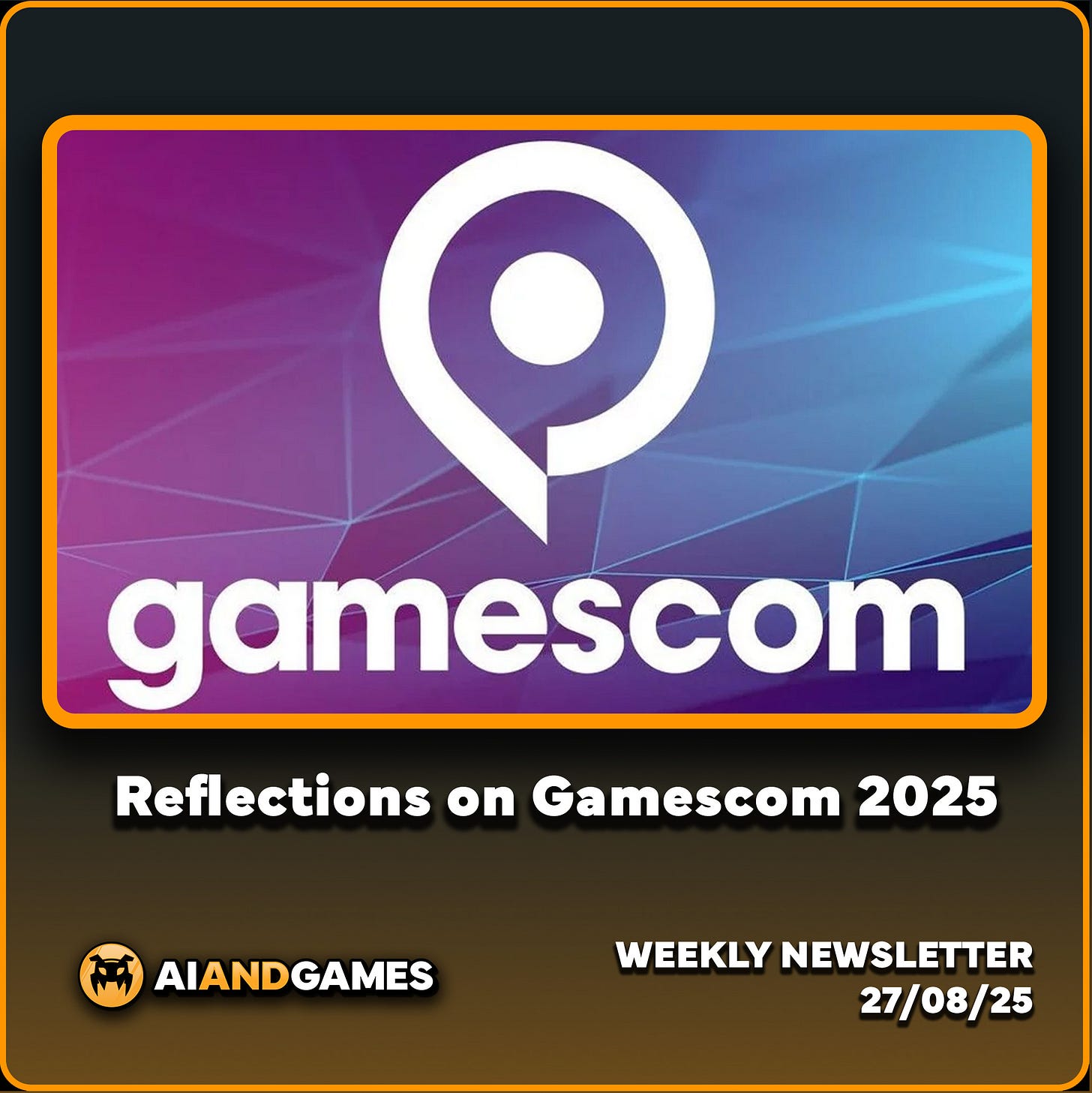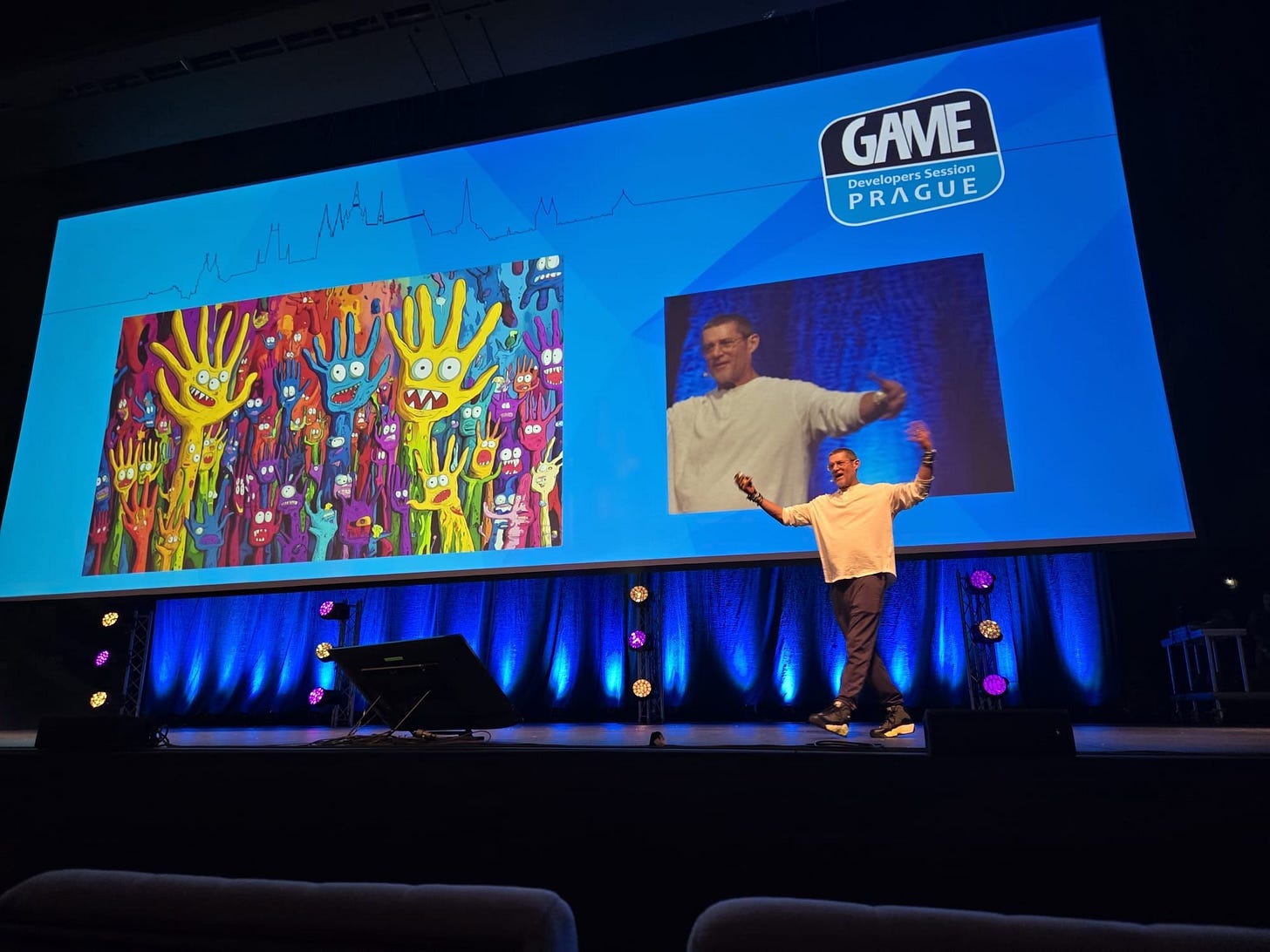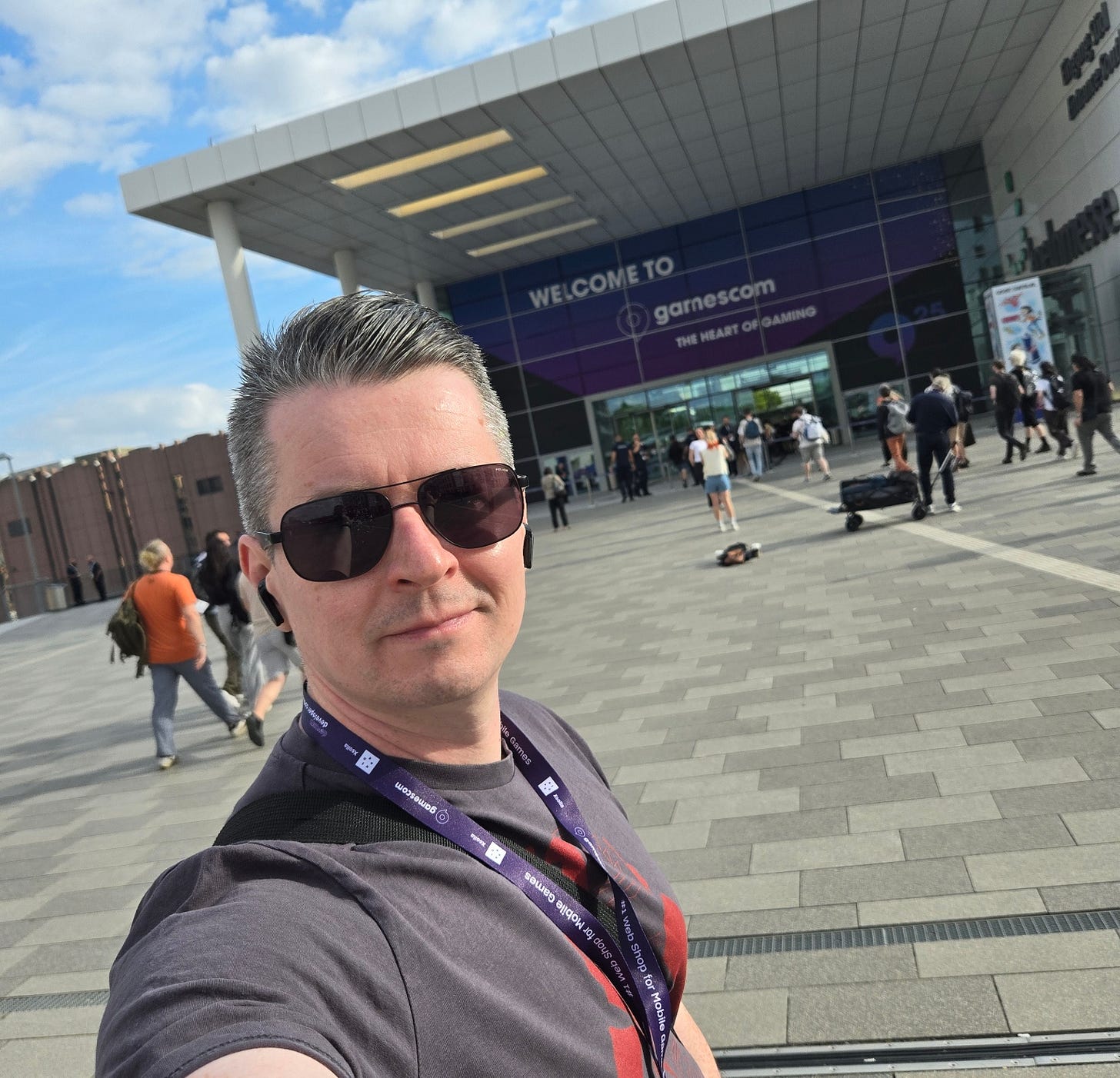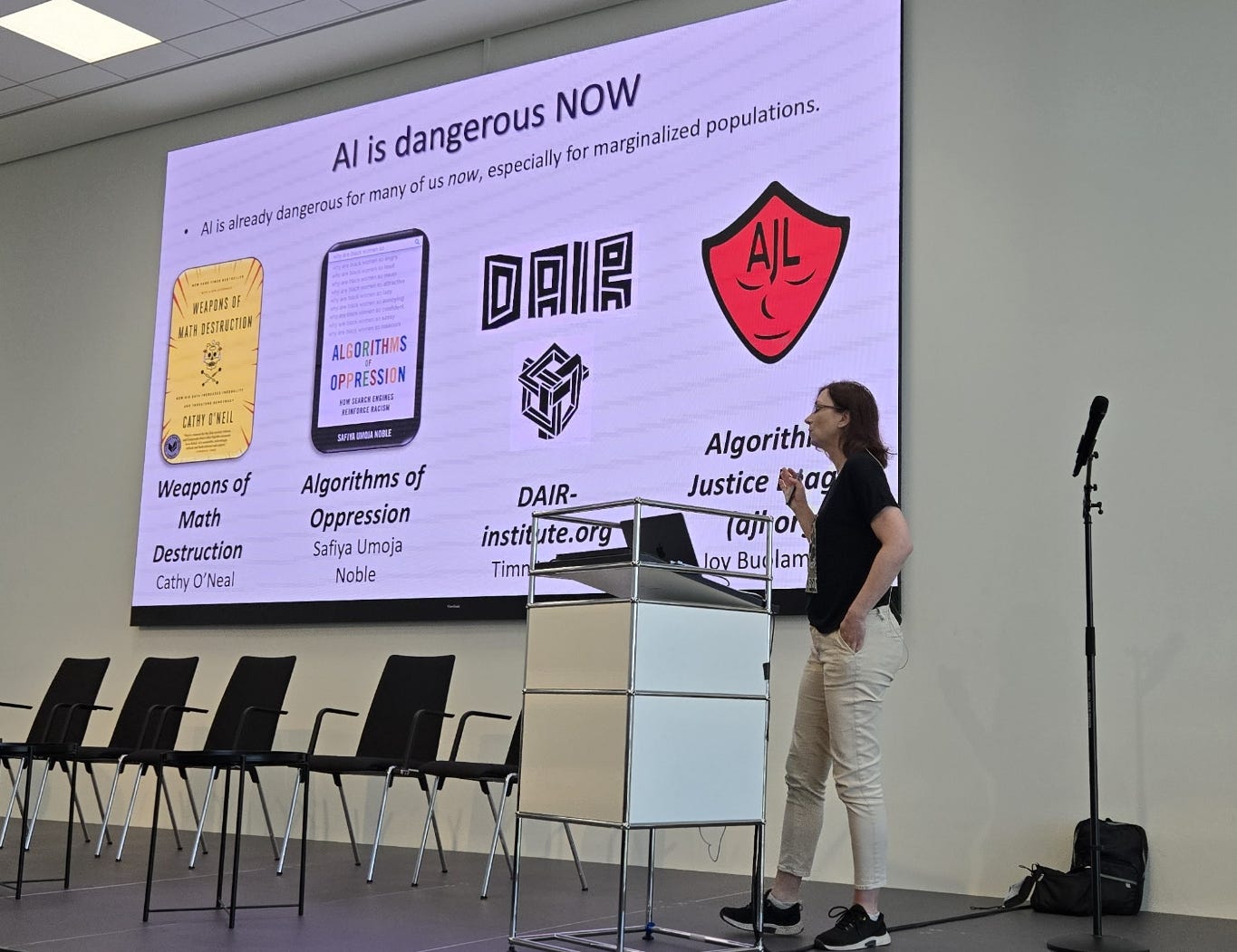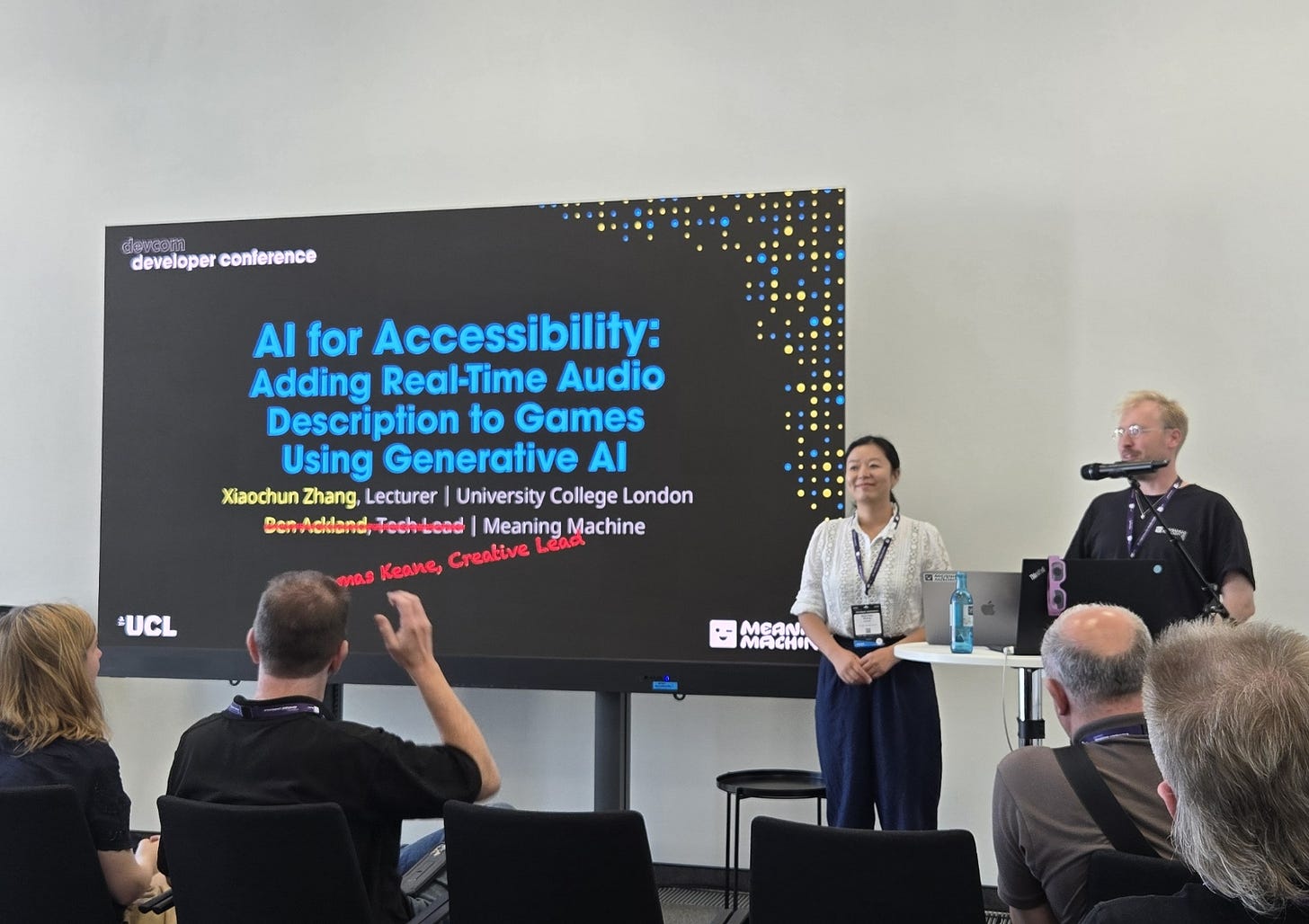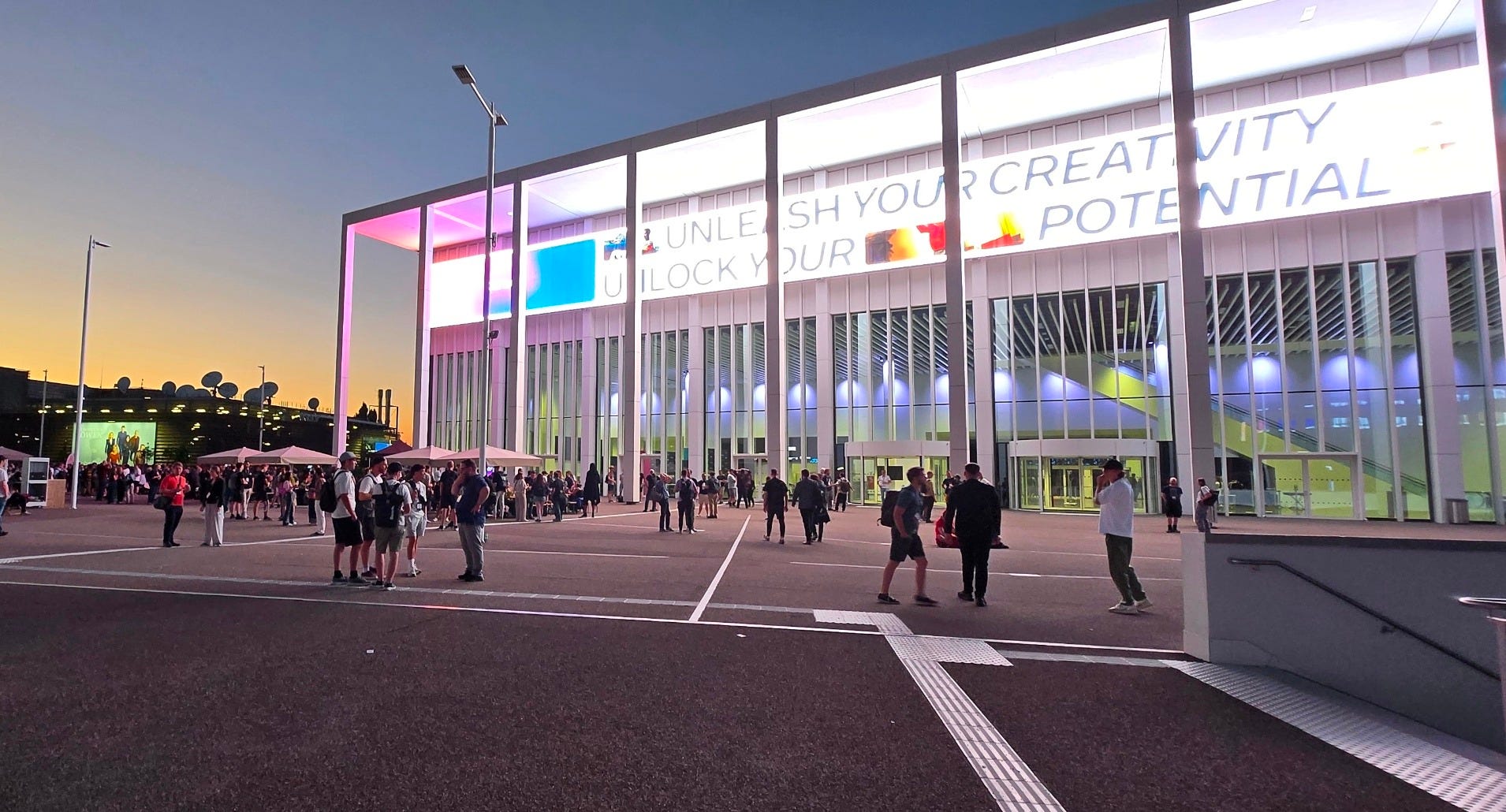Reflections on Gamescom | 27/08/25
I keep hearing the term 'AI' getting thrown around...
The AI and Games Newsletter brings concise and informative discussion on artificial intelligence for video games each and every week. Plus summarising all of our content released across various channels, like our YouTube videos and in-person events like the AI and Games Conference.
You can subscribe to and support AI and Games, with weekly editions appearing in your inbox. If you'd like to work with us on your own games projects, please check out our consulting services. To sponsor, please visit the dedicated sponsorship page.
Greetings all, and welcome back to the AI and Games newsletter. You’re reading this as I return from one event only to fly out to another. Devcom/Gamescom was intense, and by the time this reaches your inbox I’ll be at the airport for my flight to Lisbon as I deliver a keynote at the IEEE Conference on Games. Looking forward to being out there for a few days.
In the meantime, let’s run through the news, and my reflections on attending Devcom and Gamescom last week!
Follow AI and Games on: BlueSky | YouTube | LinkedIn | TikTok
Announcements
We have two small announcements for the AI and Games Conference this week! But of course, don’t forget our subscriber drive is happening!
2025 Subscriber Drive is Ongoing!
As mentioned in our previous newsletter a couple weeks back, we’re running a subscriber drive to help us gain more support for the work that we do and help us pay the bills! Check out our big deep-dive into the behind-the-scenes of our business we published a fortnight ago for more info.
We’ve seen a healthy jump of free subscribers to the site, to the point that we are close to hitting our first subscriber goal! Paying subscribers has been off to a slower start, but we’re incredibly grateful to everyone who signed up this past week or so, and look forward to delivering more exclusive content for you in the coming weeks!
As a reminder, we have a 20% discount on annual subscriptions to AI and Games until October 1st!
AI and Games Conference 2025
Some quick updates on our big event in November!
Welcome to our Associate Sponsor: Raw Power Labs
Raw Power Labs, the sister company to Raw Power Games based out in Copenhagen, seeks to bring the power of AI into the hands of game creators. We’re super excited to have them on board, and you can find out more about what they’re up to in their very own session at the AI and Games Conference 2025.
Programme Decision Emails Coming Next Week
We will be sending out decisions for the AI and Games Conference 2025 programme by the end of next week. So if you submitted a talk to us, you’ll find out whether we have accepted it onto the programme shortly. Keep an eye out for an email from the ‘speakers’ email address at our conference domain - just in case it falls into spam.
Thank you all for your patience as we make these final decisions. I want to stress now that sadly we cannot accept everything submitted to us, with a 30% year-on-year increase in talk submissions (exceeding the total received for GDC 2025’s Game AI Summit) we have an acceptance rate of around 35%, and that’s despite us expanding the event to two days! One of the board jokingly asked during reviews ‘can we run for three days?’ and I had to put my foot down! Nearly had a heart attack…
The overall quality of submissions was even higher than 2024, and it led to some really tough decisions as we debated long into multiple evenings on what we should be including. Thank you all for your continued interest, and please don’t be disheartened if your talk was not accepted. Those final 3 or 4 spots in the schedule were really tough calls to make.
Once these are all formalised, we’ll start announcing the programme publicly right here and on social media! I am super excited to announce these, we have some absolute cracking stuff coming your way.
AI (and Games) in the News
Some quick headlines that caught my eye this past week…
Google Survey Inflates AI Adoption
Last week Google Cloud published survey results suggesting that 87% of game developers now use AI agents in their workflow. 87%! That’s a lot! Why can’t I find all of these game developers when I need them?
Funnily enough this was published the same day I mentioned in my Devcom talk how so many surveys come out that artificially inflate the results, and this is no better.
Compiled by The Harris Poll on behalf of Google, they polled 615 people across the United States, South Korea, Finland, Norway, and Sweden working in game development. Frankly, I’m not confident in a survey conducted by a non-games focussed market research company, and one that as you read through it conflates generative AI with traditional game AI technologies (much like Unity did in 2023).
Note that it largely refers to ‘AI agents’ (i.e. any type of AI system), rather than specifically generative AI. In fact, if you search the report, they only use the term ‘generative AI’ twice, in the first two pages. After that they simply refer to ‘AI’ or ‘AI agents’, hoping to conflate the current tech trend with every form of AI that exists in the industry - which as I have discussed at great length on this newsletter, has been used for decades! After all in the screenshot above, I can achieve a lot of the use cases above without generative AI - in fact most of them I wouldn’t think to use generative AI for it.
Yes, we know games studios are using generative AI, and no I don’t think these numbers are remotely accurate.
Nothing to see here, move along…
Glen Schofield is “100% Behind AI”
Another week, another name in the games industry comments on AI adoption. This time around it was Glen Schofield, formerly of Dead Space and The Calisto Protocol during a conversation with The Game Business. To quote the interview:
Someday, 10 years, five years, it’ll be here. But is it going to be an engine? Right now, it’s a whole bunch of things that just kind of suck it in… and into what? It’s going to have to settle down a bit before we actually use it.
You can catch the full episode on Christopher Dring’s website, but I do want to add some editorial to this, given I had the pleasure of meeting Schofield when we were both presenting at GDS Prague last December.
I had some pretty lengthy conversations with Schofield throughout the 3+ days I was in the city, and he got to telling me a lot about his process of embracing AI to help him concept faster. In fact at one point he showed my hundreds of images on his phone that he’s created using AI tools - that’s no hyperbole, literally hundreds of images he’s concepted with help from Midjourney. As Dring’s interview implies, he is 100% behind AI. When I saw that headline, that very much meshed with my impression of the man when we spoke.
However, the thing I took away from our interaction last year was his understanding of the viability of the tools in product. He spoke of how it isn’t ready to be put into the game, of how it isn’t practical to do so, but more critically of how vital it is that junior staff members do not get to use AI tooling whatsoever.
As he explained at the time, AI will not help junior artists learn their craft: they need to learn their styles, how to iterate quickly, how to respond to feedback, and build up their own personal skillsets. It is only when they are truly at the top of their game that AI was going to be of any use to them, as a means to keep up with their own creativity.
That conversation still sits with me, given Glen is the first games artist I’ve met of that calibre that really embraces AI tooling. It left me a lot of food for thought.
Xbox ROG Ally X Launches in October with AI Acceleration
Announced during Gamescom, the Xbox ROG Ally handheld is coming out on October 16th in the US, UK, Europe and a smattering of markets in Asia, and the Middle-East.
Microsoft also announced in the press release that the ROG Ally X will have two AI features that roll-out in early 2026. To quote the press release:
Automatic Super Resolution (Auto SR): A system-level feature that uses the power of the NPU to upscale games running at lower resolutions—delivering high-resolution visuals and smooth framerates across a wide range of games, with no additional changes required from game developers.
Highlight reels: AI captures your standout gameplay moments—like epic boss battles or victories—and generates short replay clips for you to share with friends or on social channels
As mentioned, the Auto SR - essentially AI super sampling like Nvidia’s DLSS - is reliant on the NPUs on the device, these are the neural processors, or rather AI accelerators, that we expected to see given it runs on the AMD Ryzen chipset. And I strongly suspect that this sets the stage for further developments that will occur with the next generation of dedicated Xbox consoles.
No price has been announced for the hardware at this time.
Arm Also Announces AI Super Resolution Technology
A quick one, but also relevant to the previous news story. Arm also announced their own AI super resolution technology: Neural Super Sampling (NSS) which will be rolling out in 2026, provided you have an Arm GPU on your phone that can run it!
Hidden Door Rolls Out in Early Access
Among the many, many, companies suggesting they will figure out how to use large language models for gameplay purposes, one of the folks that are leading the charge are Hidden Door, who build tools to allow for playing out stories within defined frameworks (often existing stories such as classical books).
I’ve been keeping an eye on Hidden Door for years, given it seemed like they had the right ideas from both an AI perspective and a technical one. In fact, they even presented at our conference last year. And so now their launching their game platform into Early Access, you can find out more at their website.
I’ll need to check this out when I find the time.
Reflections on Gamescom 2025
So hey, you’re reading this right as I head off to IEEE Conference on Games 2025 - the largest academic conference on games research - but in the time since I got back from the Koelnmesse I’ve had a chance to note down some of my thoughts from attending both Devcom and then of course Gamescom.
For context, Gamescom is the largest video games trade event in the world. Running for 5-days out in Cologne, it’s not just a means to showcase upcoming projects to consumers, but also a place for a lot of business to be conducted, with whole segments of the event solely for trade and press.
On top of this, you also have Devcom: a 2-day developer conference that runs prior to Gamescom starting, with a number of tracks running each day. It is also the largest event of its kind in Europe.
This year was my first time attending both events, and despite having attended the likes of GDC for the past few years, and even E3 back around 2013/2014, I had yet to make the trip across the pond to Cologne. It proved very fruitful, both with my talk on Monday proving popular - being well attended, receiving good anecdotal feedback, and doubling my meetings - plus helping me understand what the broader conversations are in and around AI in game development at this time.
So I scrambled down some thoughts on my time there, and the things that stuck with me. Let’s go!
Interesting Talks at Devcom Day 1
Arriving into Cologne on Sunday afternoon, the evening was spent out for dinner and catching up with some industry friends over a Kölsch or two - admittedly, perhaps a few more than that. But Monday was the first day of the event in earnest, with the first day of talks at Devcom happening (including my own).
In between meetings and preparing for my own presentation, I managed to catch a couple of talks, and wanted to share those that I thought might be of interest to readers. Each of these highlighting both some of the emerging areas AI is now exploring, but also critically seeing non-specialist voices discuss these issues more readily.
Studio Atelico’s GARP Project
A project that I came across a few months ago when attending DevGames in Rome, Ennio De Nucci from Studio Atelico talked about their experiences working on the Generative Agents Realtime Playground (GARP).
This project is heavily inspired by Stanford’s ‘Generative Agent’s paper from 2023, in which a game-like village simulation has a group of AI agents (NPCs) wandering around and conducting their own behaviour. While interesting, the big limitation of this was that it ran entirely on LLMs hosted in the cloud (on GPT in fact), which incurs massive amount of compute cost, meaning regardless of how interesting it is as a research project, which it is, it is impractical for it to be built as a commercial game. Studio Atelico’s work has been not just to reproduce this game, but to take the idea and execute it such that you can run the LLMs locally, meaning that you run the AI models on your own GPU.
While I had previously seen a version of this talk by AI-lead and studio co-founder Piero Molino, what was valuable here was hearing De Nucci’s perspectives. Given as the designer on the project, and coming from a background of AAA game development, he could speak more from his own experiences in games on the opportunities presented by this new application of LLMs for games technology.
‘Algorithmic Blues’
A really strong presentation by Celia Hodent, who is a renowned expert in game user experience (UX) and ethics, that provided an accessible overview over how and where machine learning AI presents various problems as a result of training data and the inherent biases within them. Plus how the decisions made by larger businesses can have a significant impact on the ethics of the technology’s adoption.
I’ve followed Hodent’s work for many years, and was very much looking forward to this. Given their significant experience in the games industry (having worked at Ubisoft, and Epic Games to name but a few) combined with a good understanding of AI meant they provided a really interesting and accessible overview to these topics.
AI for Accessibility: Adding Real-time Audio Description for Games using Generative AI
One area of AI that I am always interested in, is the capacity for its use in accessibility. The idea of using AI to enable games to be more readily playable for players in response to their personal accessibility requirements is for me one of the real frontiers the technology could be exploring.
So this project, a collaboration between UK games studio Meaning Machine and Dr Xiaochun Zhang of University College London, is seeking to bring real-time audio descriptions to games for visually impaired players. As pointed out, there are 114 million blind and visually impaired people worldwide, and video games are a medium that don’t immediately lend themselves to being accessible for this demographic.
The project adopts Meaning Machine’s existing AI technology stack - which they have used for their Dead Meat game (still to be released) - that feeds game state information to a large language model. But now the technology also feeds the visuals of the game as well. This helps the LLM generate text descriptions that are evocative of both the quantitative and qualitative properties of a game scene.
The study showcased examples of trying this out in the game Frog Detective. A curious test domain for sure, but one that equally introduces a variety of challenges for the AI technology. While still in its formative stage, it strikes me as a really interesting study to follow in the coming years.
On that note, we recently ran an interview with the team at Meaning Machine - that did not discuss this topic sadly - and look forward to sharing that with you soon.
The ‘AI Generated Meetings’ Debacle
When you’re attending an event like Devcom/Gamescom, you’re keen to get out there and make some connections. Speaking personally I am there to give a talk, but also to do business. After all our main job at AI and Games is working with games studios in supporting them in understanding AI technology. So it’s critical I find the right people to engage with, and then reach out and try to have a conversation.
This of course can be quite stressful and intimidating, particularly if it’s your first rodeo. What’s even more stressful is the event apps you can use. Every big event has a mobile app where you can find out more about the schedule, and the floorplan of the event, but also who is attending and try to connect with them and arrange a meeting. It’s useful in that if you don’t have this person as a point of contact already then this is how you can reach out. Though this does mean that every event, without fail, I will get dozens of meeting requests that are clearly just large-scale bulk posting efforts to engage with anyone that is the director of a company (or one that works in AI). Meaning I get offers to meet with QA outsourcers, localisation teams, Web3 conglomerates and everything else in between.
It’s a pain in the ass. It gets in the way of getting on with business. But it’s just part of the process. So imagine how much worse it can get, when the organisers use AI to auto-generate meetings they think would be a good fit for you?
I mean, pardon my language, but come the fuck on…
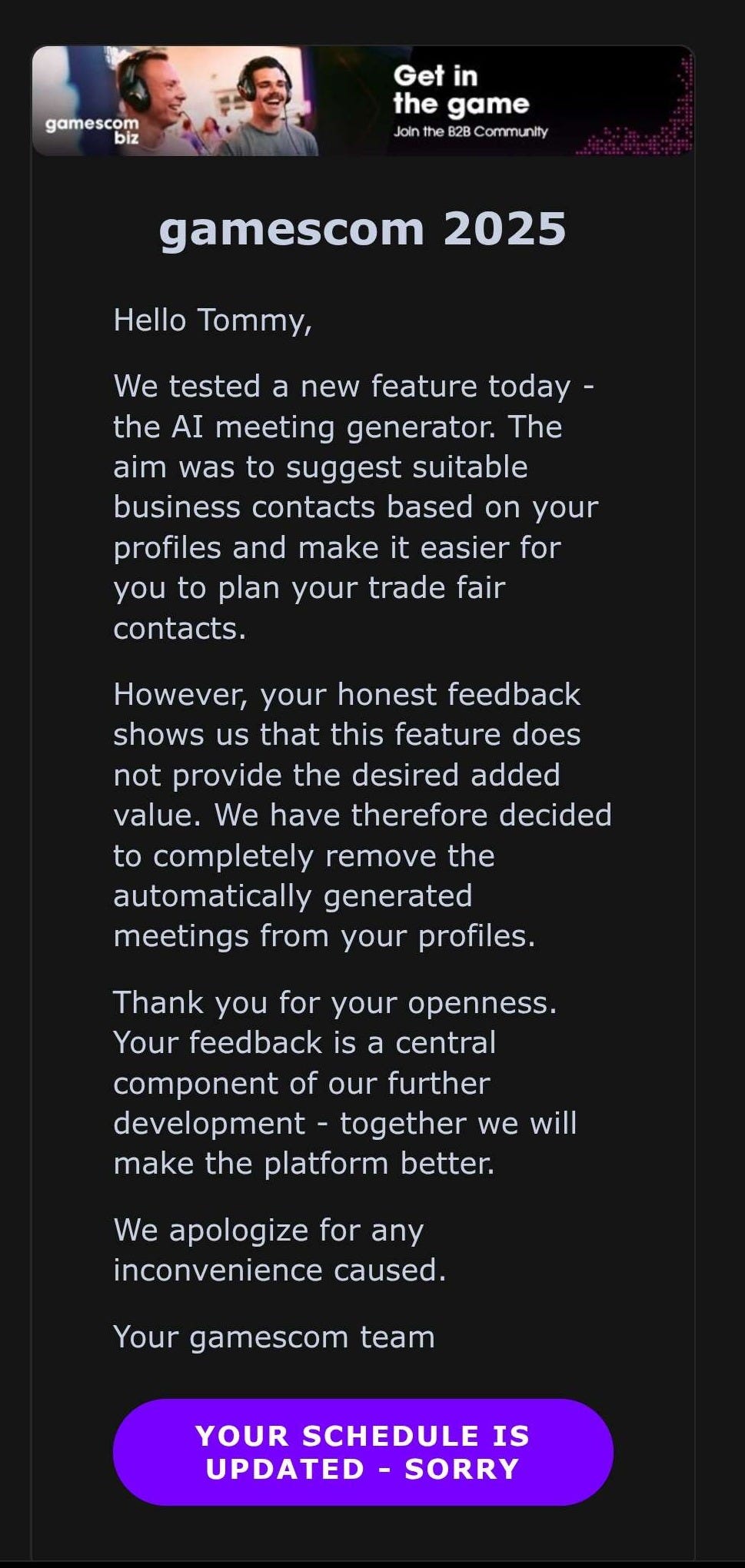
This went as well as one could expect, where I starting receiving auto-generated meeting requests that frankly made no sense. I mean I’d imagine something like this might even attempt to have me connect to someone I already know outside Gamescom but haven’t connected with on the app?
Nope. Didn’t even do that.
As you can see above, they clearly got the message of how useless this was and the AI-generated appointments promptly disappeared from our schedules. Though funnily enough it did prove to be a good icebreaker in meetings, as we asked one another whether or not we had received these pointless AI appointments.
The Leadership Summit @ Devcom Day 2
For reasons unknown to me - maybe they’re a fan of the newsletter - I was invited to join the Devcom Leadership Summit. Running on day two of the event, it brought together a variety of people from across the sector, I assume leaders, to discuss the big issues surrounding the industry. Including the likes of future markets and trends, of present challenges in funding, of weathering the current storms of the sector.
While interesting, I also found it highly concerning how frequently the term ‘AI’ was thrown around in a rather haphazard fashion. I could play bingo with phrases such as ‘AI is just another tool’, ‘AI will help us create faster’, and ‘our creativity will be enhanced by AI’ being spouted frequently, and regularly. It reminded me of London Tech Week back in June, which I am still washing out the aftertaste from.
Fortunately two of the panellists who discussed their thoughts, notably Irena Pereira (Unleashed Games) and Nika Nour (Savvy Games Group) had relevant and practical thoughts on this. The former I asked a question during their panel and gave a really thoughtful and experience-driven response, and the latter has been a part-time doctoral candidate reading generative AI, so not all is lost!
Despite Everything, Business is Booming
Earlier in the year I spoke of how GDC felt rather lacklustre, and that for a number of reasons ranging from attendance, to expenditure on the show floor, it felt like people are questioning the value of the event. Go back and read my thoughts on this I wrote in April.
However, while this might suggest that business itself is slowing down, you’d be hard pressed to come up with a similar narrative at Gamescom. The trade and business areas were very busy throughout my 2.5 days on the floor, and the conversations surrounding project financing and general health of the industry seemed to be better than they were before.

How much of that is a reflection of not being in the US, where the market and broader economy is a mess, and how much is it that the games industry feels like it’s slowly turning the corner from the post-pandemic come down is open to speculation. That’s for other games-business-focussed newsletters to focus on, but the conversations seemed healthier.
A Concerning Lack of Studio AI Policy
During my talk at Devcom on Monday, and in many other presentations this past year, I talk about the importance of building an AI policy at games studios. A company cannot sensibly navigate AI’s intersection with game development without having clearly identified and communicated guidelines on what is considered acceptable adoption of artificial intelligence tools and technologies.
Even if this policy is to reject generative AI outright - a valid and common stance - it must be laid out such that teams can discuss how this is enforced in production, and what steps are taken to ensure it continues to be an evolving set of guidelines as sentiment and technology evolves.
In recent months I’ve not just raised the importance of AI policy, but asked audiences whether their employer has an policy in place. During my presentation on Monday, it was the poorest response to it yet, with maybe 20% of the ~150-200 people attending stating that they were aware of a policy. This runs risk of all sorts of challenges for a games studio going forward.
BTW, we help games studios putting this policy together! So yeah, feel free to chat to us if this is a point of concern.
The AI Conversation is Ongoing, But Improving
I was fortunate to have a whole bunch of meetings with studios of various shapes and sizes throughout the week. Naturally these conversations are for our ears alone, but there were threads cropping up that I was certainly glad to be hearing.
For one it feels like the conversation on how and where generative AI is adopted in game production, if at all, is moving slowly but surely from an emotional reaction to a more results and experience-driven consensus. This was in fact a point I made in my Devcom talk, that the industry needs to make some headway and studios must share their individual experiences such that a collective consensus can gather.
But for me what was interesting was hearing the range of different results. As anticipated, nobody told me what the investors and hype-merchants advocate; that suddenly their game productions have sped up drastically and they exist in a new AI-driven nirvana. Rather everyone is finding issues with the tools in different scenarios, or at different parts of their process.
In fact the question of how much money AI will save in game production is very much an open one, and something that cropped up in numerous conversations. Whether it actually helps larger studios in the long run is something that may take years to quantify, given the changes that have to be made to existing processes to adopt AI in the workflow - or the time spent in exploring its capabilities - are time consuming and by extension costing studios money!
Meanwhile the legal issues surrounding generative AI were raised in many a conversation. The vast majority of studios flat out refuse to embrace generative AI outputs in their product. Rather they’re happy to use it in ideation and prototyping phases - though as discussed that has also been a mixed bag.
While I feel we still need more specific insights to be shared to the industry as a whole, I’m happy to see the conversation is still moving forward, and that studios are achieving their own learnings on the matter.
Wrapping Up
Thanks for catching up with us on this post-Gamescom issue, I hope to have another issue over to you next week as I recover from two conferences back-to-back.
I figured I’d leave you this week with my ‘AI facepalm of the week’ and that was the headline over the weekend on The Guardian about a discussion over a multibillion-pound deal to give ChatGPT Plus to UK citizens.
I bring this up because a) it’s stupid, b) why? and c) I’ve mentioned before that Peter Kyle, the secretary of state for science, innovation and technology, has a bad habit of getting lobbied, and this was one of the conversations he had with OpenAI earlier this year.
Kyle already has a reputation for being over enthusiastic for embracing increasingly mid generative AI tools. After all he conceded to using ChatGPT to help him do his job by, y’know, asking it how to do his job. It’s all rather cringe-inducing.
Now of course in the report it was stated this wasn’t really taken seriously or moved forward with as a proposal. But I’m curious, did it not go forward because Kyle thought it was a bad idea, or because he’d have to convince chancellor Rachel Reeves to free up something like £2 billion at a time when she’s trying to balance the books.
I need more tea. See you all next week!



